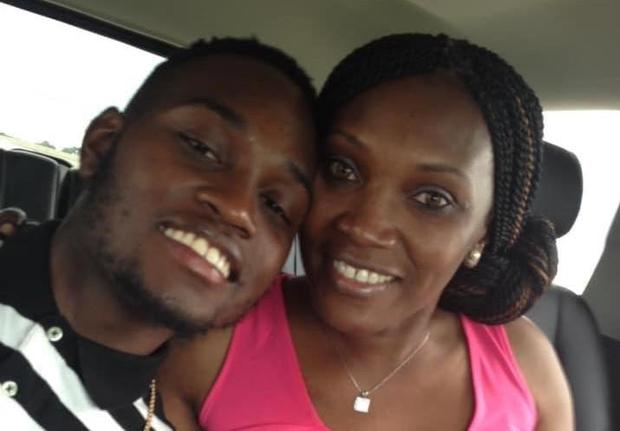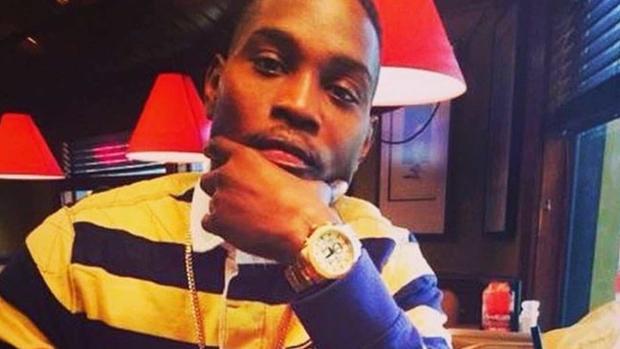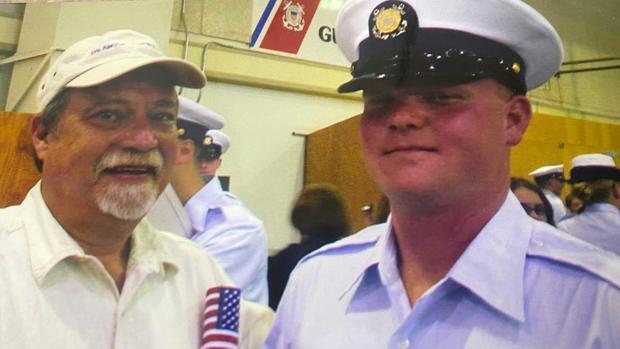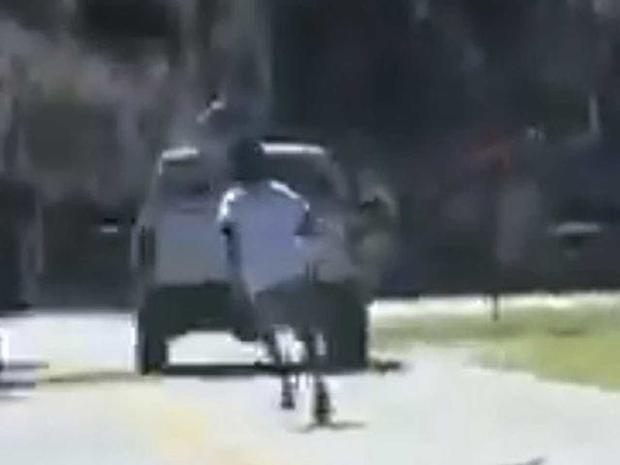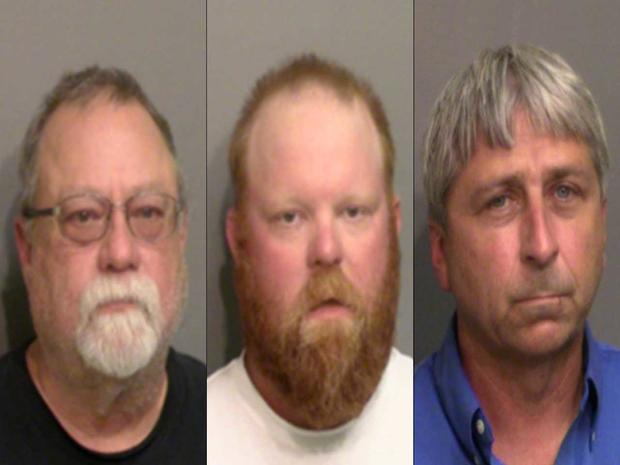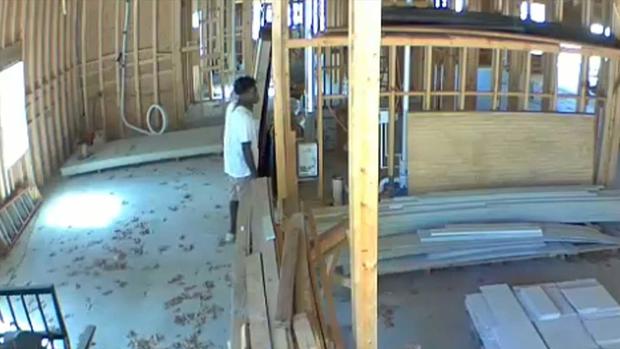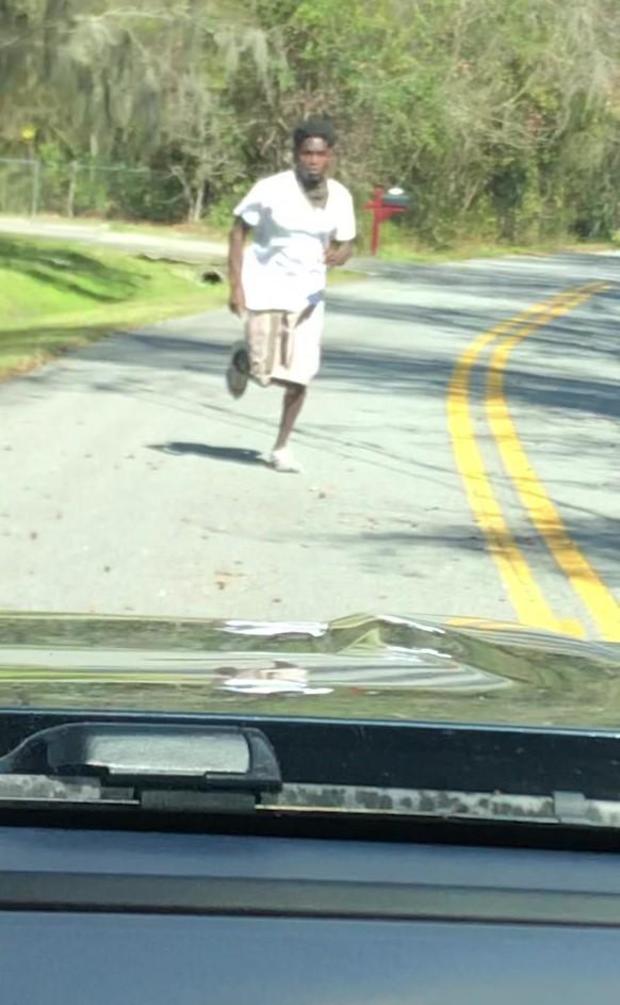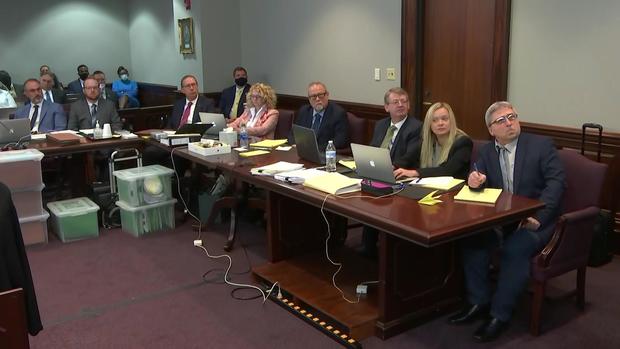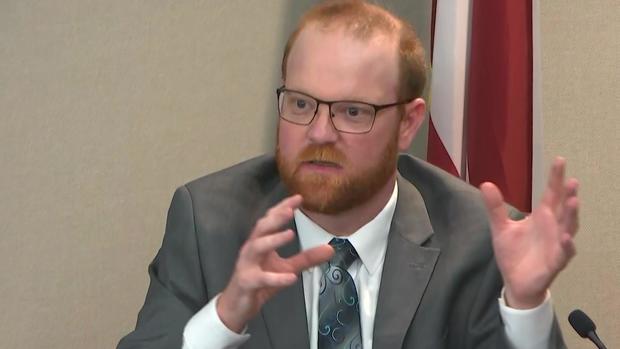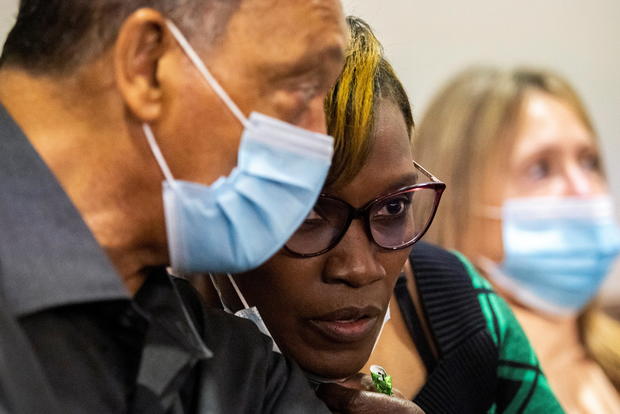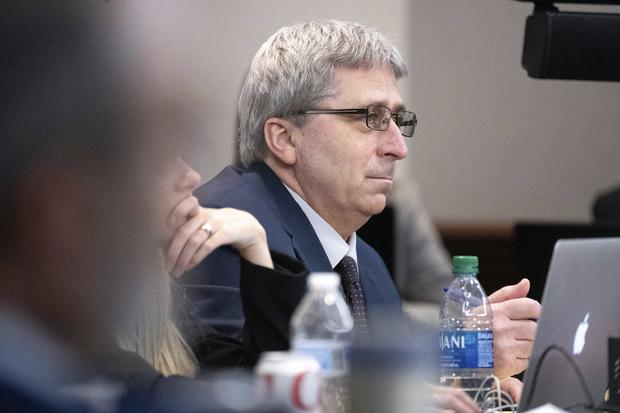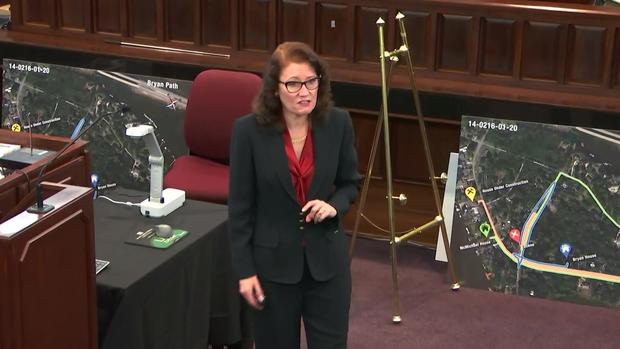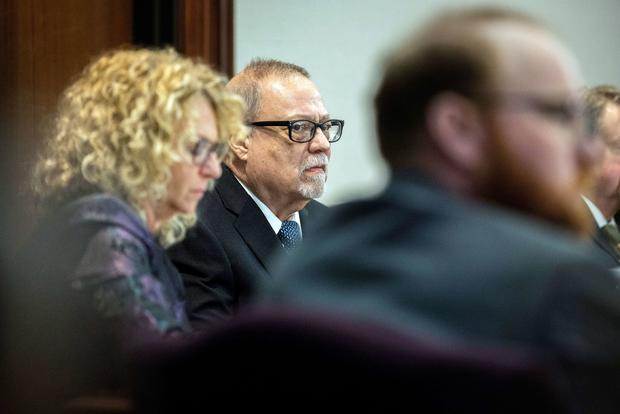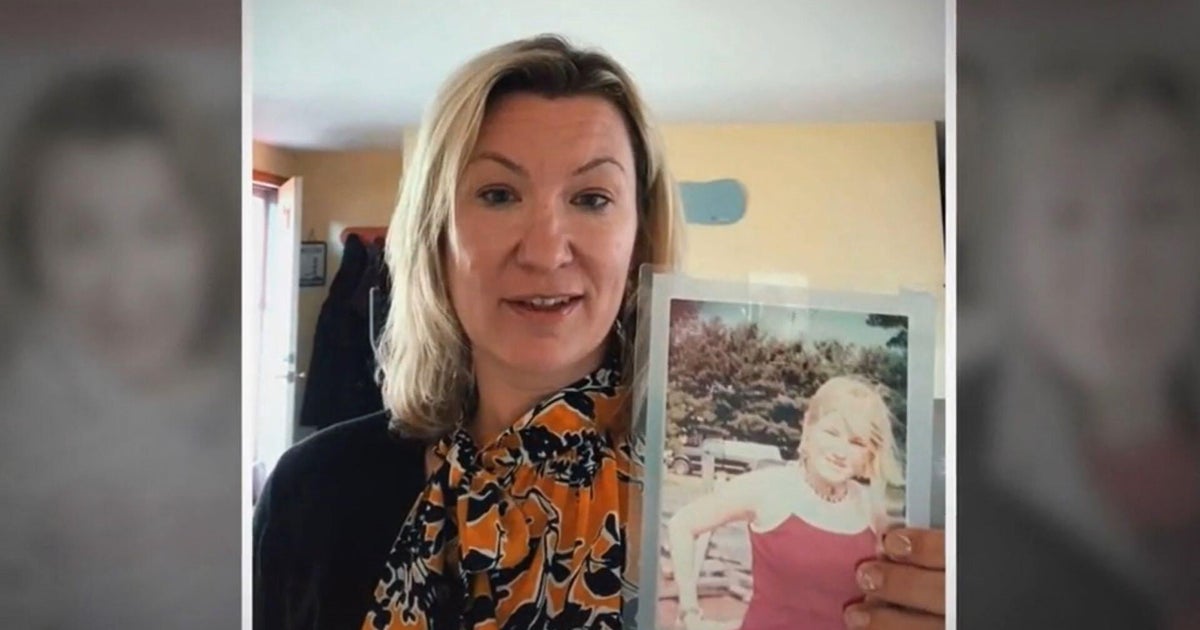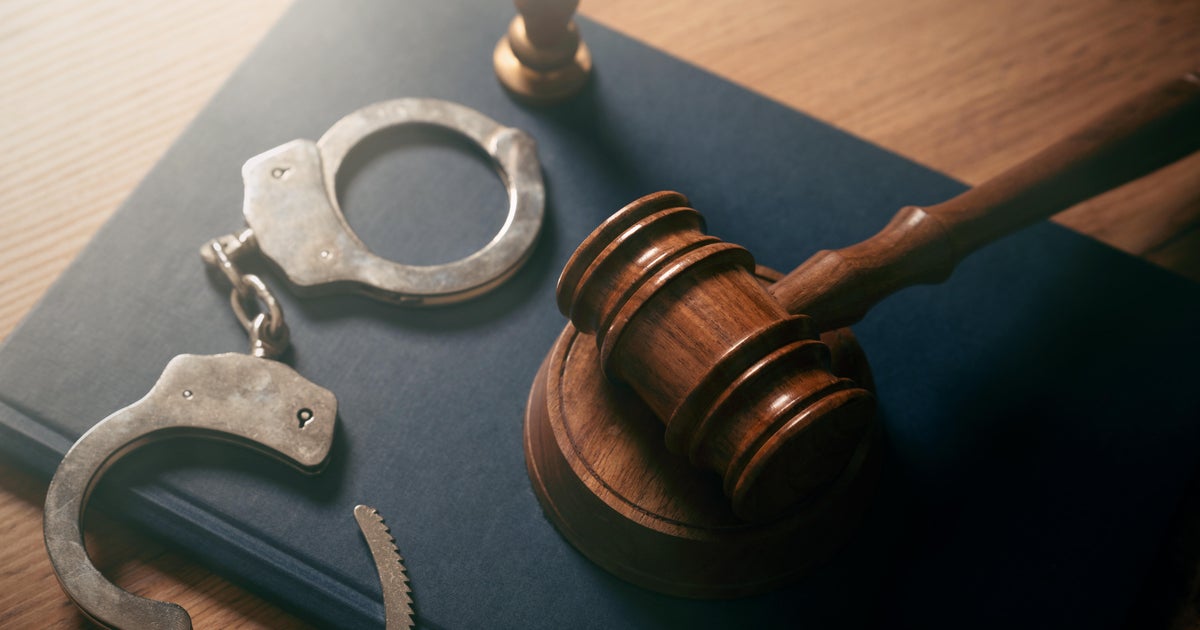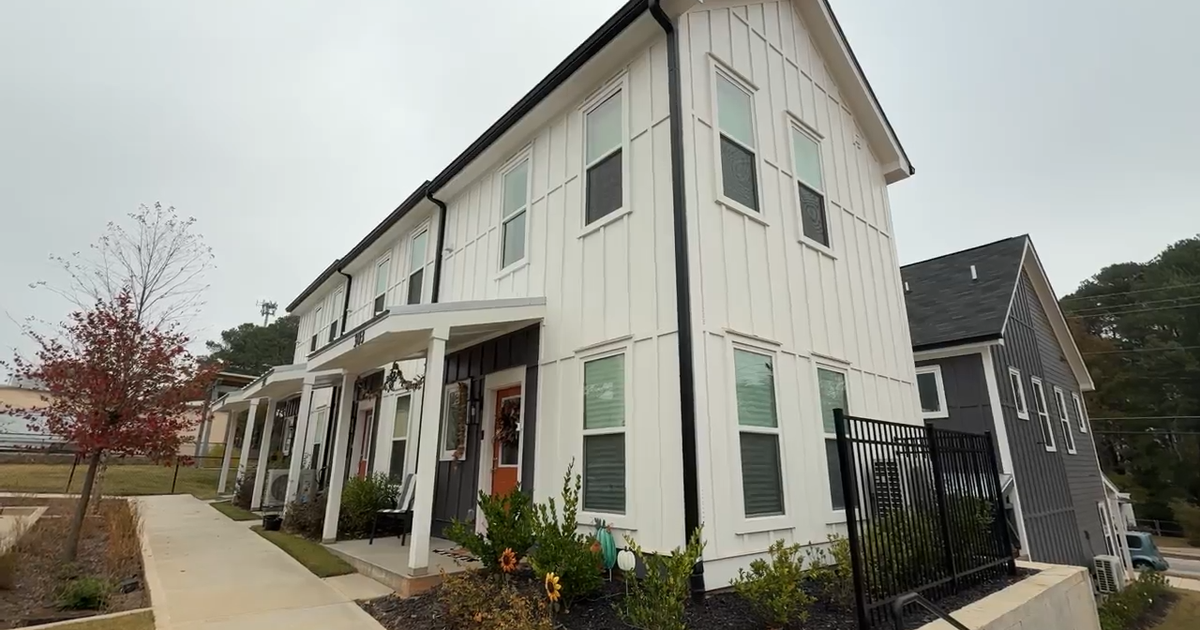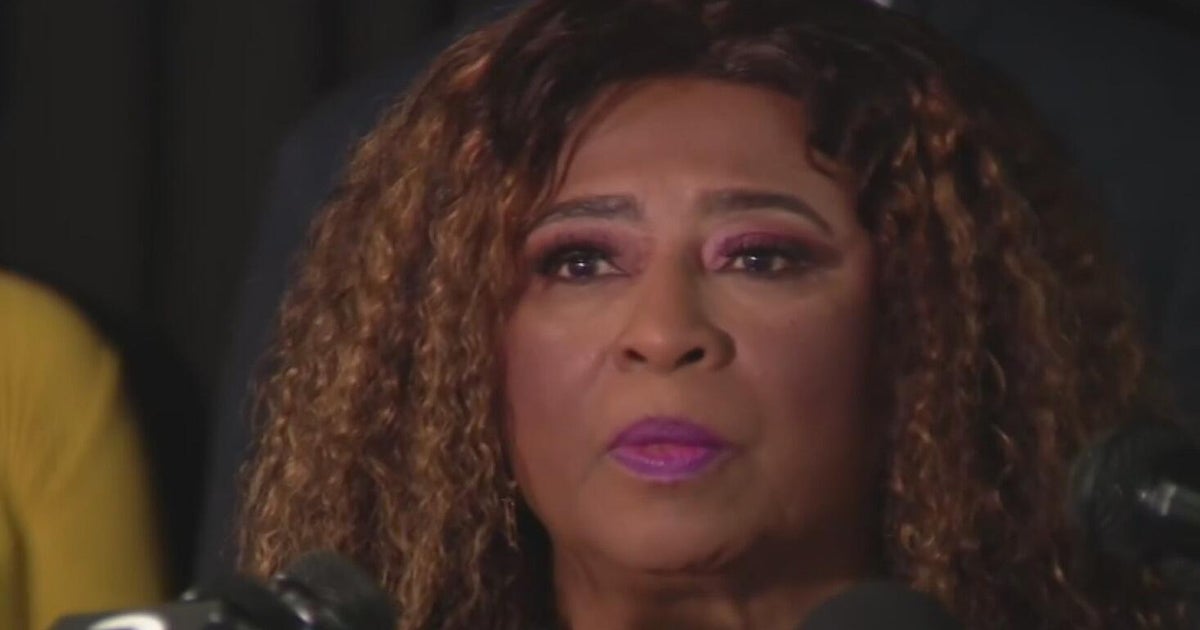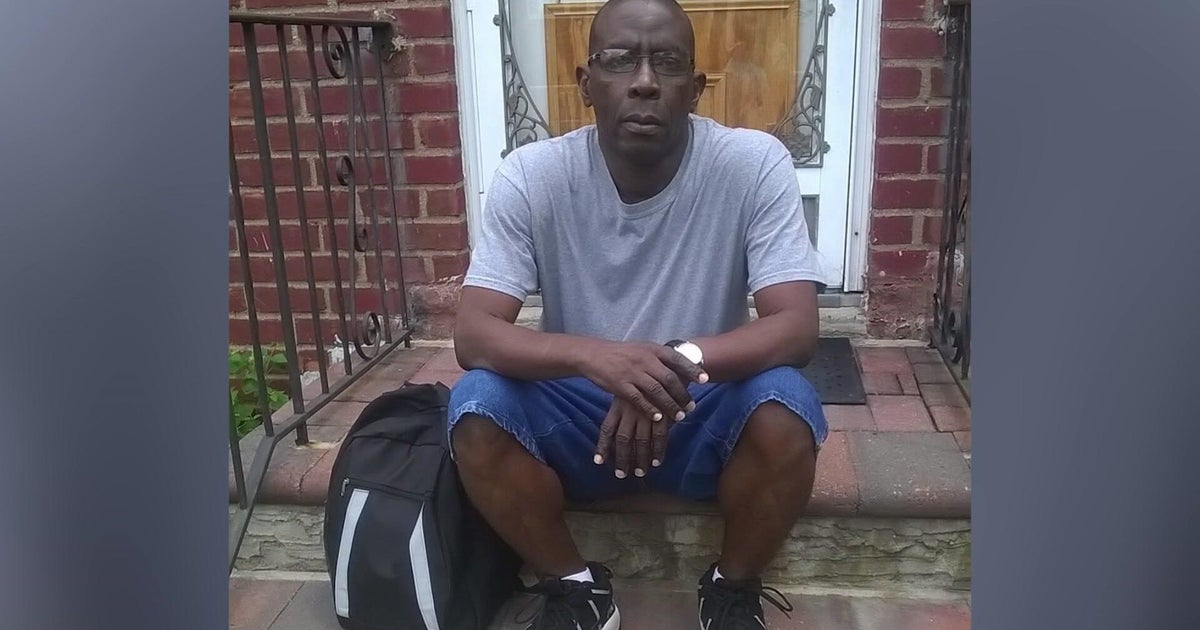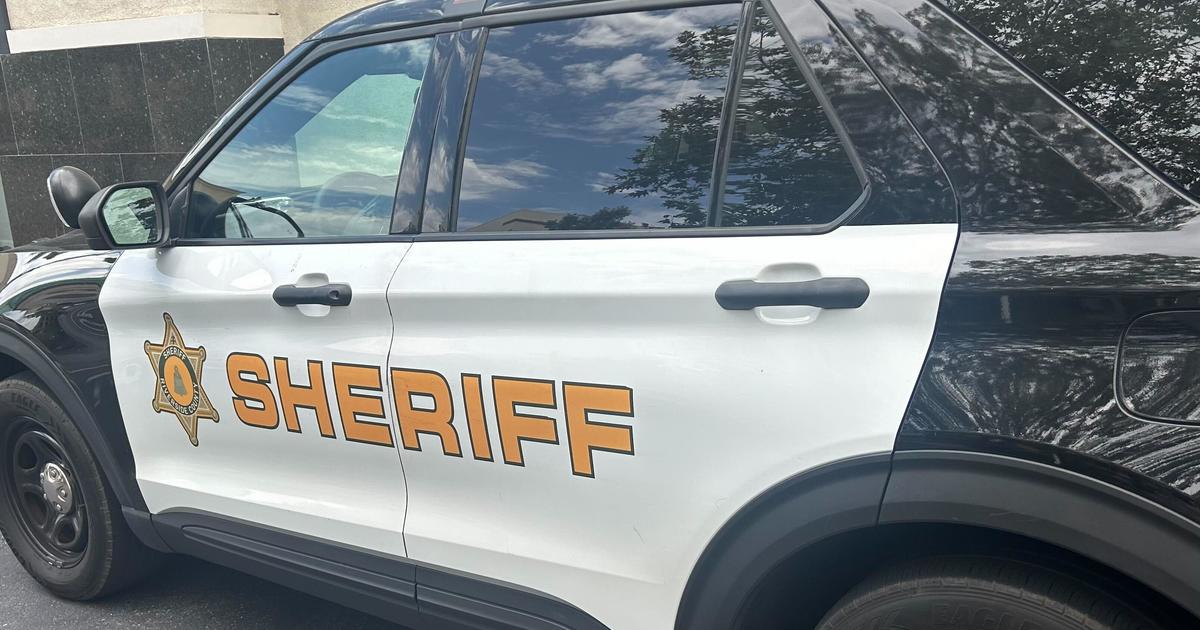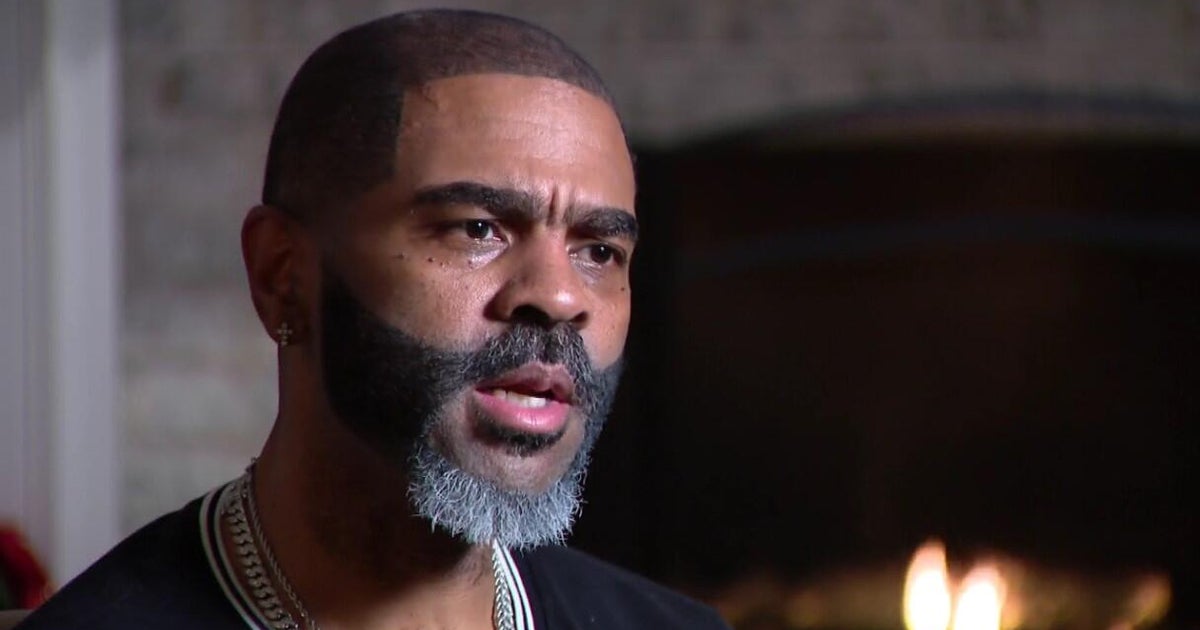Wanda Cooper-Jones fulfills promise to slain son Ahmaud Arbery: "I will get justice"
From the beginning, there have been two starkly different stories about what led to the death of Ahmaud Arbery.
PROSECUTOR LINDA DUNIKOSKI: Mr. Arbery was under attack. … and they made their decision to attack … because he was a Black man running down the street.
LAURA HOGUE | Gregory McMichael's defense attorney: Ahmaud Arbery was not an innocent victim. He was an intruder.
Twelve jurors were asked to decide which of those stories they believed.
PROSECUTOR LINDA DUNIKOSKI: He was trying to get away from these strangers who are yelling at him, threatening to kill him.
JASON SHEFFIELD | Travis McMichael's defense attorney: He raises the gun, and he does it to defend himself.
PROSECUTOR LINDA DUNIKOSKI: … and then they killed him.
Through it all, Wanda Cooper-Jones, listened, hoping to make good on a promise she made to her son.
Wanda Cooper-Jones: "Don't worry, son. I promise you the day that I laid you to rest that I will get answers, and I will get justice."
Wanda Cooper-Jones: I haven't really grasped that Ahmaud is gone forever
Ahmaud Arbery was one of three children.
Wanda Cooper-Jones: I was young when I had them. We grew up together.
His parents split up. Cooper-Jones says she worked two jobs while raising him and his older siblings, Marcus Jr. and Jasmine.
Omar Villafranca | CBS News correspondent: How close were you?
Jasmine Arbery: Really close. He knew all my secrets. He defended me when I couldn't defend myself.
Akeem Baker was a lifelong friend.
Akeem Baker: Ahmaud saw the best in people. … He always saw the potential that his friends were capable of.
Coach Jason Vaughn: Maud was such a leader. Literally, the kids followed Maud.
He showed leadership and grit on the gridiron, says high school football coach Jason Vaughn.
Coach Jason Vaughan: Maud was so easy to love. … And he just had a bright spirit about him.
Cooper-Jones says it was after high school when his bright spirit seemed to dim.
Wanda Cooper-Jones: I noticed … he wasn't as talkative to me.
After a year at a technical college in 2013, Arbery lost interest in school, says Jasmine Arbery.
Jasmine Arbery: Getting into a low point in life where he had gotten in trouble …
Over the next few years, Ahmaud Arbery had some brushes with the law and was arrested twice: once for bringing a gun onto school grounds and again for shoplifting. He was on probation.
Omar Villafranca: We're you worried that his run-ins with the law were going to follow him?
Wanda Cooper-Jones: Very worried. I mean, that's something that I carried every day.
His behavior, she says, was changing. So, she asked to have him evaluated. In December 2018, Ahmaud was diagnosed with schizoaffective disorder. But Jasmine Arbery says her brother was never dangerous.
Jasmine Arbery: He didn't have episodes. He wasn't violent.
And Cooper-Jones says Ahmaud even came up with his own effective therapy: running.
Wanda Cooper-Jones: He felt like he was in total control when he ran.
Wanda Cooper-Jones: We had our challenges, but we were working together to fix those.
Arbery was planning to go back to school. Cooper-Jones remembers the last time she saw her son, she was leaving on a business trip.
Wanda Cooper-Jones: I'll be gone for a couple of days, and I love you. … And his last words to me was, "I love you too."
Then came the phone call just days later on February 23, 2020.
Wanda Cooper-Jones: This gentleman identified himself as an investigator from Glynn County Police Department.
She says the investigator told her that Ahmaud had broken into a house and was shot and killed.
Wanda Cooper-Jones: How could this happen? Is it real? Is it a bad dream?
Jasmine Arbery: I remember falling on the floor. … It was a really big shock – even that he was burglarizing the house. It just —that was a huge shock to me.
Despite Ahmaud's personal struggles, no one who knew him believed that story.
Jasmine Arbery: And I knew that wasn't true.
Coach Vaughn: Maud ain't breaking in any houses. Like, nah, something's not right about this.
Wanda Cooper-Jones: I had to get answers to find out exactly what happened.
Wanda says she pushed the police for more details, convinced they were not leveling with her. Shortly after Ahmaud was killed, her suspicions only grew when she picked up the local paper.
Wanda Cooper-Jones: It told us that, Ahmaud was actually chased and trapped in and killed in the streets.
Chased and killed in the street — not breaking into a home, committing a crime.
Jasmine Arbery: The whole thing of him burglarizing the home was not true.
Soon, Cooper-Jones saw their names in the newspaper. The men who were present when her son was shot to death: Gregory McMichael, a former law enforcement officer, his son, Travis, a Coast Guard veteran, and William "Roddie" Bryan, a mechanic.
She wondered why they weren't charged with any crime.
Lee Merritt: The crime here is obvious. There's a dead man on the side of the road.
Civil rights attorney Lee Merritt is representing Arbery's family.
Omar Villafranca: Why wasn't anyone arrested immediately? You have dead man on the floor.
Lee Merritt: And the victim was Black, the suspects were White, and this is South Georgia.
Merritt believes every bit of this case was affected by Arbery's race, and the fact that Gregory McMichael had friends in high places.
Lee Merritt: He was a close friend of the DA for the county.
And McMichael once worked worked as an investigator in District Attorney Jackie Johnson's office.
Omar Villafranca: So, what does that tell a responding officer?
Lee Merritt: That this person is not going to be someone that you can arrest. They are above the law. They are the law.
Jackie Johnson recused herself from the case. George Barnhill, a DA from another county, took over. Cooper-Jones discovered Barnhill was Facebook friends with Gregory McMichael.
Lee Merritt: Wanda Cooper Jones did her homework and found connections.
By early April, more than 30 days had passed without an arrest in the Arbery shooting. And people who had known Ahmaud refused to let his death go unanswered and encouraged the community to apply pressure.
It apparently had an effect. Barnhill became the second prosecutor to recuse himself. A third DA, Tom Durden, took over — still no one was charged for Arbery's death.
Wanda Cooper-Jones: And I knew, if I didn't fight, it would not be an arrest.
And then came the release of that video.
WHAT REALLY HAPPENED TO AHMAUD?
On May 5, 2020, 72 days after the shooting, something happened that seared Ahmaud Arbery's name into the American psyche.
NORAH O'DONNELL | "CBS Evening News," May 5, 2020: Video has surfaced of an African American man being chased down and killed while his family says he was just out jogging. We caution you — this video is hard to watch.
It turns out, one of the three men present at the shooting, William "Roddie" Bryan, had been recording cell phone video. His footage mysteriously appeared online.
Akeem Baker: I called my mom crying ... I was just hurt.
DA Tom Durden immediately said he planned to seek indictments. On May 7 -— 74 days after the shooting — came two arrests.
GBI DIRECTOR VIC REYNOLDS [to reporters]: Agents from the Georgia Bureau of Investigation effectuated an arrest on two individuals, Greg and Travis McMichael, charging them with both felony murder and aggravated assault.
It was just days after the video went viral.
Two weeks later, Roddie Bryan was arrested on charges including felony murder. But by then, DA Durden had asked to be replaced. With images of Ahmaud Arbery's final moments still haunting laptops and living rooms around America, the question of what really happened to Ahmaud would be front and center.
Lee Merritt: … to know that that's — that was his last moments — this evil ...
"48 Hours" went with Lee Merritt to retrace Ahmaud Arbery's last steps. Authorities have put together a chronology of what happened that day based on video and witness accounts.
On February 23, 2020, Arbery had gone running in Satilla Shores, a predominately white subdivision just two miles from his own neighborhood. He started his workout before 1 p.m.
Omar Villafranca [standing in a street in the neighborhood]: Why do you think everybody comes to run here?
Lee Merritt: I mean, look at it.
Lee Merritt: It was the other side of the tracks. Homes are gorgeous. Beautiful moss-covered trees. You could smell the honeysuckle.
In that neighborhood is a home under construction at 220 Satilla Drive – outfitted with security cameras. For months it's been a curiosity to passersby, like a couple, kids, and several times, Arbery. And on the last day of Ahmaud's life, he stops by again.
Lee Merritt: While he's inside of the home, one of the neighbors notices.
The neighbor calls police.
CALLER: There's a guy in a house right now, a house under construction.
911 OPERATOR: And you said someone is breaking into it right now?
CALLER: No, it's all open. It's under construction.
It's 1:08 p.m. The site's security video shows him looking around. At the time the house is still missing doors. There are no signs prohibiting entry
Lee Merritt: He comes out of this front entrance way …
And Arbery starts running again –
Omar Villafranca: Which way does he go?
Lee Merritt: He goes straight this way — the opposite of the way that he came, still not ready to go home. Because if he wanted to go home, he would go left.
The neighbor is still watching.
CALLER: He's running right now, there he goes right now.
911 OPERATOR: You said it was a male in a black T- shirt?
CALLER: White T-shirt. Black guy, white T-shirt.
And now, another neighbor has taken a special interest. Gregory McMichael says he recognizes the runner from one of the construction site surveillance videos. He alerts his son Travis. The McMichaels decide to give chase.
Lee Merritt: They grabbed their guns, and they go after him.
They followed Arbery in their pickup truck, down Satilla Drive onto Burford Road.
Lee Merritt: They claim that they begin to yell at him, "Hey, pull over, stop, we want to talk to you."
Omar Villafranca: Why do you think Ahmaud kept running and didn't stop?
Lee Merritt: So, there were men pursuing him with guns.
The McMichaels are still on Arbery's tail when he runs past Roddie Bryan's house. Bryan sees the McMichael's truck chasing Arbery, and decides to join in. At this point, Arbery turns to run the other way, and Bryan follows in his truck. He starts filming with his phone.
Lee Merritt: This is where things really escalate because as he turns around to run the other direction, he's confronted with another truck.
According to the men's statements to police, they continue chasing Arbery through the neighborhood.
Lee Merritt: He is able to run around them, and at that point he takes off up here …
But Bryan catches up with him again. Investigators say the McMichaels have taken another route to get in front of Arbery. They're waiting for him near the corner of Satilla Drive and Holmes Road. By this point, Gregory McMichael is in his truck bed with a .357 Magnum. At about 1:15 p.m., he calls 911:
GREGORY MCMICHAEL: I'm right here at Satilla Shores. There's a black male running down the street –
911 OPERATOR: Satilla – where, where, where at Satilla Shores?
GREGORY MCMICHAEL: I don't know what street we're on. Stop right there! Damn it! Stop!
McMichael's son Travis is standing near the driver's door, shotgun in hand. Arbery changes direction, and Travis McMichael meets him by the front bumper.
Lee Merritt: You don't try to outrun a bullet. He had to engage at that point.
Lee Merritt: He knew he had to fight for his life.
What happened next is hotly contested – and difficult to watch.
Lee Merritt: The first shot actually strikes Ahmaud in the chest.
There's a struggle. A second shot, and then a third.
Lee Merritt: You see Ahmaud stumble and … he collapses.
Police arrive within minutes. They find Gregory and Travis McMichael near Arbery, who is lying in the road. Police body cams are rolling.
GREGORY MCMICHAEL [police body cam video]: He had no choice man.
GREGORY MCMICHAEL: Travis, you had no choice. You had no choice.
Ahmaud Arbery is pronounced dead at the scene.
Police question both McMichaels:
GREGORY MCMICHAEL: This guy who we've seen on video numerous times breaking into these other houses, he comes hauling ass down the street …
Gregory McMichael tells police he believed Arbery was responsible for break-ins in the neighborhood and that's why they started to chase him.
GREGORY MCMICHAEL: I run into the house, I said "Travis, the same guy that broke into a house down there."
OFFICER: Who's Travis?
GREGORY MCMICHAEL: My son … the guy that shot him.
TRAVIS MCMICHAEL: I live right there. I was — we've had break-ins …
Travis McMichael says he caught sight of Arbery outside that house under construction two weeks earlier – and then today his father saw him running by.
TRAVIS MCMICHAEL: So, we run out there to stop him, to talk to him …
GREGORY MCMICHAEL: We pull up beside him and say "hey, stop, stop, we want to talk to you." And he just keeps on running.
TRAVIS MCMICHAEL: Stopped, coming out of the truck, running at us. I told him "stop, stop, stop" till he hit me. … I had nothing to do. There's nothing else I can do.
Roddie Bryan, the neighbor who joined the chase, was also interviewed.
UNIDENTIFIED POLICE OFFICER #3: All right, so you're a passerby or coming through?
RODDIE BRYAN: Not necessarily.
RODDIE BRYAN: I mean, if the guy would have stopped, you know, I mean, find out what was going on, he obviously was up to something, I mean, this would've never happened. You know, should we have been chasing him? I don't know, you know?
OPENING STATEMENTS
It's been a long year, eight months, and nearly two weeks since Wanda Cooper-Jones lost her son. Now, she's in Brunswick to see the three men charged with Ahmaud Arbery's murder face a judge and jury.
Wanda Cooper-Jones: I didn't think that we would ever get this far because it was so dark in the very beginning. It was very dark.
But before opening statements, more disturbing news:
NORAH O'DONNELL | CBS EVENING NEWS: Tonight, there are accusations of discrimination as the racially charged Ahmaud Arbery trial gets underway with 11 White jurors and just one Black juror.
Despite the nearly all-White jury, Cooper-Jones has faith that the evidence will carry the day.
Wanda Cooper-Jones: My job is to be there each time Ahmaud's name is called in court. And I'll be there every day. Every day, all day.
Linda Dunikoski makes the opening statement for the prosecution.
LINDA DUNIKOSKI: We are here because of assumptions and driveway decisions.
Central to their case: that the three defendants acted as vigilantes and set into motion the deadly chain of events on February 23, 2020.
LINDA DUNIKOSKI: It all started when Greg McMichael saw him running down the street.
Dunikoski tells the jury Arbery was chased for 5 minutes before Gregory McMichael made that 911 call.
LINDA DUNIKOSKI: What does he say his emergency is? This is the emergency, ladies and gentlemen.
911 OPERATOR: What's your emergency?
GREGORY MCMICHAEL: There's a Black male running down the street.
LINDA DUNIKOSKI: "There's a Black male running down the street." That's the emergency.
She says Ahmaud Arbery was under attack that day.
LINDA DUNIKOSKI: So how do you know Mr. Ahmaud Arbery was under attack by strangers with intent to kill him? Because Greg McMichael told the police this: "Stop or I'll blow your f------ head off." That's what he said to Mr. Arbery. … How do you know this was an attack on Mr. Arbery? Because Greg McMichael said it perfectly. "Mr. Arbery was trapped like a rat."
The prosecutor points out that but for William "Roddie" Bryan, Arbery could have escaped.
LINDA DUNIKOSKI: Mr. Bryan tries to hit Mr. Arbery four different times with his pickup truck … He gets so close to Mr. Arbery that Mr. Arbery actually has a palm print and white T-shirt fibers that are consistent on that car.
LINDA DUNIKOSKI: And that brings us to the video …
The cell phone video shot by Bryan, and seen the world over, is played for the first time for the jury.
As the lynchpin of the prosecution's case, it will be analyzed frame by frame throughout the trial. But Gregory McMichael's attorney Franklin Hogue says it doesn't tell the full story.
Franklin Hogue: You're looking through the knothole of a fence.
In their opening statements, the McMichaels' defense contends they were only trying to stop Arbery that day and hold him for police because they suspected him of burglary. And, they claim, under Georgia's citizen's arrest law, they had every right to do it. That law was overhauled after Arbery's shooting.
ROBERT RUBIN | Travis McMichael's defense attorney: Travis McMichael felt a duty and responsibility … that made him willing to put himself at risk to help the police detain Ahmaud Arbery.
Gregory McMichael had said he recognized Arbery from a neighbor's security footage.
FRANKLIN HOGUE: Greg McMichael was absolutely sure this was the guy.
ROBERT RUBIN: So, they're going to detain him for the police … this is what the law allows. … "Stop, stop, get down, stop." This guy is not stopping.
At that point, his attorney, Jason Sheffield, says Travis McMichael was afraid Arbery would overpower him.
Omar Villafranca: Even though Travis has a gun and a vehicle, and Ahmaud Arbery has two legs?
Jason Sheffield: You still can be afraid while you have possession of a firearm.
It turns out the McMichaels were so sure the shooting was justified, they're the ones who arranged to have the video leaked.
Omar Villafranca: Do you believe that this video establishes his innocence?
Franklin Hogue: Yes, I do. But not just the video … You need more.
For the defense, the more is what they say was happening in Satilla Shores months before the shooting.
ROBERT RUBIN: Crime had gone up … the break-ins, the theft didn't end, especially for a man named Larry English.
Larry English was the owner of that home under construction at 220 Satilla Drive. English had reported several trespassers on his property.
Larry English: Four, five, maybe six different times.
The prosecution plays several 911 calls English made and clips from his security footage: those neighborhood kids, a White couple, and Ahmaud Arbery, who enters four times before the February 23, 2020 incident. English told investigators Arbery never took anything.
But Arbery's presence at that construction site was causing suspicion among some neighbors.
Lee Merritt: A lot of people began to impute the criminality on the Black person that was coming onto the property.
And less than two weeks before the shooting, police responded to another 911 call of an intruder at English's house – this time made by Travis McMichael.
TRAVIS MCMICHAEL [February 11, 2020]: I just caught a guy running into a house being built …
911 OPERATOR: What did he look like?
TRAVIS MCMICHAEL: He's a Black male, red shirt, white shorts … Also, I don't know if he's armed or not.
GREGORY MCMICHAEL: Travis actually saw him.
Police body cam captures a conversation with a group of neighbors who have gathered at the scene:
OFFICER [body cam video]: Nah, this guy he's always on foot, nobody in the neighborhood knows who he is … And all the times on the video that Mr. English has sent me — he sent me one now, it's always been just in there plundering around, he hasn't seen him actually take anything.
Here's Gregory McMichael chiming in:
GREGORY MCMICHAEL [body cam video]: It's criminal trespassing – very least.
OFFICER: Yeah, yeah, very least so — loitering and prowling.
Franklin Hogue: This is 12 days before the event. So, this neighborhood's on edge, and the McMichaels are right at the center of it.
LINDA DUNIKOSKI: Well, here's the thing: What does Mr. Arbery do? He shows up, he wanders around for a few minutes, and he leaves.
And prosecutors say there's no evidence Arbery was responsible for any of the crime in Satilla Shores. On February 23, 2020, after Arbery was killed, Gregory McMichael admitted to a responding officer he didn't actually know if Arbery had committed a crime before they gave chase.
LINDA DUNIKOSKI: Did Greg McMichael ever indicate to you at that time that he thought Ahmaud Arbery – "the guy" – had committed a crime that day?
OFFICER BRANDEBERRY: No ma'am.
LINDA DUNIKOSKI: Did he ever tell you that "Oh, we were gonna detain this guy and wait for the police to come and investigate"?
OFFICER BRANDEBERRY: No, ma'am.
After eight days of testimony, the prosecution rests. And a surprise witness takes the stand for the defense.
A SURPRISE WITNESS
KEVIN GOUGH: Mr. Bryan was … attempting to take a video and record Mr. Arbery rather than shoot him or hurt him.
Roddie Bryan's lawyer Kevin Gough has saved his opening argument until the prosecution rests. And he uses it to paint a picture of his client as an innocent bystander in this case.
KEVIN GOUGH: Roddie Bryan is working on his porch, his front porch, minding his own business.
Bryan owns a gun, but when he decides to join the chase, Gough points out, he doesn't even bring it.
KEVIN GOUGH: He walks out to his car with a cell phone and his keys, and that speaks volumes as to the intentions of Mr. Bryan on the day in question.
But prosecutors say Bryan was more than a bystander — forcing Arbery off the road with his truck. Gough suggests to the jury it was Arbery who was acting aggressively and trying to get into the truck.
KEVIN GOUGH: That scared Mr. Bryan …
And when Gough finishes his opening, a surprise witness takes the stand.
JASON SHEFFIELD: The defense calls Travis McMichael.
JASON SHEFFIELD: Do you want to testify today?
TRAVIS MCMICHAEL: I do.
JASON SHEFFIELD: Why?
TRAVIS MCMICHAEL: I want to give my side of the story.
Defense attorney Jason Sheffield points out that with Travis McMichael's Coast Guard training, he understands the appropriate use of force.
JASON SHEFFIELD: Is it your goal to escalate situations?
TRAVIS MCMICHAEL: No, absolutely not.
The defense says Travis McMichael had reason to suspect Arbery was armed that day, because 12 days earlier, Travis McMichael says he spotted him by the construction site at night reaching into his waistband.
TRAVIS MCMICHAEL : I step out … as he comes out of the shadows … he comes directly to me … and he pulls up his shirt and goes to reach in his pocket or waistband area. ...
JASON SHEFFIELD: So, what happened?
TRAVIS MCMICHAEL: It freaked me out.
When Arbery ran past his house the day of the shooting, Travis McMichael tells the jury, he thought his father had called police. The defense had claimed he had probable grounds to suspect and detain Arbery under Georgia's old citizen's arrest law.
JASON SHEFFIELD: So, you talked to him. What did you say?
TRAVIS MCMICHAEL: Yeah. So, I said, "Stop for a minute stop, will you please stop?
JASON SHEFFIELD: Did you actually use the word please?
TRAVIS MCMICHAEL: I'm sure I did. …
JASON SHEFFIELD: Does he say … "Leave me alone," or anything?
TRAVIS MCMICHAEL: Nothing.
Travis McMichael says that put him on edge — even more so when he saw Arbery encounter Roddie Bryan in his black pickup.
TRAVIS MCMICHAEL: It looks like he's grabbing the truck. …
TRAVIS MCMICHAEL: My thought was, "why is he attacking a truck?"
He says he temporarily lost sight of Arbery. So, he got out of his truck, dialed 911 and gave the phone to his father.
TRAVIS MCMICHAEL: I don't want to escalate the situation … something's not right. … I'm not gonna escalate this any further.
When Arbery reappeared, running in his direction, Travis McMichael says he yelled at him to stop and grabbed his shotgun from the truck.
TRAVIS MCMICHAEL: He was … like a runnin' back, ready to – ready to bolt or to move any way he wanted, you know? But he's focused on me.
Travis McMichael says he raised his weapon only after Arbery began closing in on him.
TRAVIS MCMICHAEL: This is what I needed to … to deter him…to stay — to do not come at me. …
JASON SHEFFIELD: And what happened?
TRAVIS MCMICHAEL: [overtalk] I get to the front of the truck and by the time I get to the front of the truck … he turns and is on me, is on me, I mean, in a flash — immediately on me.
JASON SHEFFIELD: What were you thinking at that moment?
TRAVIS MCMICHAEL: I was thinking of my son. …
JASON SHEFFIELD: What'd you do?
TRAVIS MCMICHAEL: I shot him.
Wanda Cooper-Jones: I think about my son as well. His son's alive, my son is gone forever.
In the end, Travis McMichael says pulling the trigger was a pure act of self-defense.
TRAVIS MCMICHAEL: He had my gun. … this is a life-or-death situation.
JASON SHEFFIELD: You shot him? You — you shot him?
TRAVIS MCMICHAEL: Yes. … At that point I was in shock … realized that he was deceased. … And I looked up and the police were right there. I stood up, realized that, you know, that I got a gun here. … police were on scene, so I walked over to the side and put my shotgun down. After that it was — it's a blur.
On cross examination, Prosecutor Linda Dunikoski suggests the deadly confrontation never would have happened if the McMichaels hadn't decided to chase a man with no actual proof he'd committed a crime.
LINDA DUNIKOSKI: Never threatened you at all?
TRAVIS MCMICHAEL: No ma'am. …
LINDA DUNIKOSKI: Didn't pull out any guns?
TRAVIS MCMICHAEL: No ma'am.
LINDA DUNIKOSKI: Didn't pull out any knife?
TRAVIS MCMICHAEL: No ma'am.
LINDA DUNIKOSKI: Never reached for anything, did he?
TRAVIS MCMICHAEL: No.
LINDA DUNIKOSKI He just ran?
TRAVIS MCMICHAEL: Yes, he was just running. …
LINDA DUNIKOSKI: You could have just let him run, correct?
TRAVIS MCMICHAEL: I could have, but I also wanted to make sure that everything was OK down the road and see what was happening …
LINDA DUNIKOSKI: You know that no one has to talk to anyone they don't want to talk to, right?
TRAVIS MCMICHAEL: That's correct.
The defense calls a series of neighbors, who claim Satilla Shores had been gripped by a crime wave.
JASON SHEFFIELD: Were you aware whether guns had been stolen from cars in the neighborhood?
CINDY CLARK | Neighbor: Yes.
In this climate, Arbery's presence drew attention.
BROOKE PEREZ | Neighbor: Mr. English would … call and … say "the colored man is back, at my house."
Word would travel fast.
SUBE LAWRENCE | Neighbor: "Tell the boys to get inside and lock the doors, the guy is back at Larry's." …
ROBERT RUBIN: How did that make you feel, the fact that there was someone coming over?
SUBE LAWRENCE: Violated, upset that my kids weren't getting to grow up in the safe neighborhood I grew up in [cries].
As the trial moves along, a familiar, albeit masked face appears at the audience.
KEVIN GOUGH: The Right Rev. Al Sharpton managed to find his way into the back of the courtroom.
Kevin Gough complains.
KEVIN GOUGH: We don't want any more Black pastors coming in here … sitting with the victim's family trying to influence a jury in this case.
After Gough complains, the Reverend Jesse Jackson arrives in court. Outside the jury's presence, Gough keeps pushing – arguing repeatedly that the Arberys' high-profile supporters want to turn the trial into a spectacle – some say making a spectacle of himself in the process.
KEVIN GOUGH: If a bunch of folks came in here dressed like Colonel Sanders with white masks sitting in the back, I mean, that would be –
JUDGE TIMOTHY WALMSLEY: I don't want to hear about that.
The judge is having none of it.
JUDGE TIMOTHY WALMSLEY: As long as things are not disruptive, and it's not a distraction to the jury or anything else that's going on in the courtroom, so be it.
Days later, hundreds of Black clergy have gathered to support the Arbery family. They hold a vigil in front of the courthouse.
REV. AL SHARPTON [standing next to Cooper-Jones]: We gonna keep comin' till we get justice!
Gough repeatedly moves for a mistrial, and Prosecutor Dunikoski has had enough.
LINDA DUNIKOWSKI [Nov. 18 charge conference]: Your honor, Mr. Gough is a brilliant lawyer … He stood up in this courtroom, knowing full well he's on television … He got the response he wanted … Now he's motioned for a mistrial based on something that he caused.
Kevin Gough denies it, but according to Lee Merritt, team Roddie Bryan makes a last-minute request.
Lee Merritt: Roddie Bryan asked for a plea deal.
Omar Villafranca: He asked for a plea deal?
Lee Merritt: Yeah. He wanted to turn state evidence.
But there would be no deal, and the case would soon head to the jury.
THE VERDICTS ARE IN
It has been a long and difficult trial to sit through for Wanda Cooper-Jones. But sit there she has — listening to 10 days of testimony, watching her son dying over and over again on cell phone video, and hearing the man who killed him explain himself.
But she still has the same question she had on February 23, 2020, the day Ahmaud Arbery lost his life.
Omar Villafranca: If the prosecution let you walk up there and cross-examine Travis McMichael, what would you have asked him?
Wanda Cooper-Jones: Why? Why did you choose to kill my son?
In closing arguments, lead prosecutor Linda Dunikoski laid out the State's position in plain language: the three men accused of murdering Ahmaud Arbery had no reason to kill him.
LINDA DUNIKOSKI: … they made their decision to attack Ahmaud Arbery in their driveways because he was a Black man running down the street.
Dunikoski says the defendants had no right to make a citizen's arrest.
LINDA DUNIKOSKI: In order to make an arrest of an offender the offense has to be committed in your presence. Do we have that here? No!
What they have, Dunikoski tells jurors, is a case of cold-blooded murder.
LINDA DUNIKOSKI: It was three on one, two pickup trucks, two guns. Mr. Arbery, nothing in his pockets. Not a cell phone, not a gun, not even an ID.
As for the defense's claim of self-defense …
LINDA DUNIKOSKI: Who brought the shotgun to the party? Who took the shotgun outta the car? Who pointed the shotgun? The guy's runnin'. Runnin' away from them for 5 minutes.
LINDA DUNIKOSKI: They can't claim self-defense under the law because they were the initial, unjustified aggressors. And they started this.
But Travis McMichael's attorney Jason Sheffield says his client believed he had no other choice.
JASON SHEFFIELD: You are allowed to defend yourself. You are allowed to use force that is likely to cause death or serious bodily injury if you believe it's necessary.
Gregory McMichael's attorney Laura Hogue claimed that Ahmaud Arbery was no innocent victim.
LAURA HOGUE: Turning Ahmaud Arbery into a victim after the choices that he made does not reflect the reality of what brought Ahmaud Arbery to Satilla Shores in his khaki shorts, with no socks to cover his long, dirty toenails.
There was an audible gasp in the courtroom.
Omar Villafranca: I mean, you got up and left.
Wanda Cooper-Jones: Yes.
Omar Villafranca: Why?
Wanda Cooper-Jones: I didn't expect them to go that low.
Closing arguments for the defendants wrapped up with Roddie Bryan's attorney Kevin Gough trying to distance his client from the murder.
KEVIN GOUGH: Roddie Bryan's presence is absolutely superfluous and irrelevant to the tragic death of Ahmaud Arbery.
He says that Arbery would have died whether or not Roddie Bryan chose to leave his porch that day.
KEVIN GOUGH: What difference does it make whether Roddie Bryan is there or not? Mr. Arbery can't outrun bullets.
After almost a day-and-a-half of closing arguments, the case that had gripped the nation was in the hands of 12 ordinary citizens.
JUDGE TIMOTHY WALMSLEY: I ask that you retire to the jury room.
It took about 11 hours. The verdict was in. The prosecution team — Larissa Ollivierre, Paul Camarillo and Linda Dunikoski — braced themselves.
Omar Villafranca: When you hear that the verdict is in, what's your reaction?
Linda Dunikoski: I stopped breathing and Paul had to come over to me and go, "Breathe, breathe." And because it was like it went up here into, into my chest right here, and I just stopped breathing because then I knew this was it, it was done.
Three defendants, nine charges each. Judge Timothy Walmsley begins with Travis McMichael.
JUDGE TIMOTHY WALMSLEY: Count one, malice murder. We the jury find the defendant Travis McMichael guilty.
Guilty on all charges.
The other two men guilty on multiple charges, including felony murder.
Omar Villafranca: What was it like after the verdict seeing Wanda and Marcus?
Linda Dunikoski: It was incredibly emotional. We hugged and the waves of grief were coursing through her … She's been holding her breath for a year and nine months.
Outside court, the grieving mother spoke as she always had: from the heart.
Wanda Cooper-Jones: It's been a long fight. It's been a hard fight. But God is good.
Wanda Cooper-Jones had done it. She had kept her promise to Ahmaud.
Wanda Cooper-Jones He will now rest in peace.
In February 2022, Travis McMichael, Gregory McMichael and Roddie Bryan are scheduled to face federal hate crime charges in a separate trial.
Former DA Jackie Johnson has been charged with violating her oath of office for her handling of Ahmaud Arbery's shooting.
